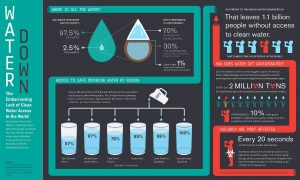The International Panel on Climate Change (IPCC) estimates that by the year 2100, approximately 56 to 75% of humanity will experience water scarcity. As Lester Brown points out in Full Planet, Empty Plates, there are no substitutes for water. No other resource, natural or manmade, can replace water as an essential component of life on earth. A future of water shortages, as predicted by the IPCC, would also mean a future of food shortages, desertification, exacerbated effects of climate change, loss of topsoil, and diminishing biodiversity throughout the global ecological system. With this, Brown illustrates a devastating reality, “…not a single country has succeeded in arresting the fall in its water.” Despite the gravity of this burgeoning global catastrophe, there are still opportunities potential solutions.
 Adults drink an average of four liters of water per day; however, the overwhelming majority of human water consumption is virtual. By comparison, 2000 liters of water is required to produce a single day’s worth of food for an average adult (Almonds, anyone?!). Food production is extremely water-intensive. Thus, a future of water insecurity most certainly includes a steady decline in global food production and increasingly rampant hunger. Water shortages affect food production in several compounding ways. Not only does food require an exorbitant amount of water to produce, but healthy soil and ensured biodiversity are both dependent on water. With climate change and rising temperatures, desertification is a growing problem. Declining water supplies aggravate the incidence of dust bowls and non-arable land. Climate change, its effects, and falling water supplies have a cyclical effect, creating reinforcing feedback loops that generate ever-deepening ecological issues.
Adults drink an average of four liters of water per day; however, the overwhelming majority of human water consumption is virtual. By comparison, 2000 liters of water is required to produce a single day’s worth of food for an average adult (Almonds, anyone?!). Food production is extremely water-intensive. Thus, a future of water insecurity most certainly includes a steady decline in global food production and increasingly rampant hunger. Water shortages affect food production in several compounding ways. Not only does food require an exorbitant amount of water to produce, but healthy soil and ensured biodiversity are both dependent on water. With climate change and rising temperatures, desertification is a growing problem. Declining water supplies aggravate the incidence of dust bowls and non-arable land. Climate change, its effects, and falling water supplies have a cyclical effect, creating reinforcing feedback loops that generate ever-deepening ecological issues.
With privilege and power, affluent countries also have the opportunity and responsibility to lead the charge towards a multifaceted global solution. This solution must include efforts towards conservation, community-level and global cooperation, community-based water systems – to curtail corruption and inequity, greater incorporation of and reliance on drought-resistant crops for food production, and good governance at every level – from local to international law. We currently face the most challenging web of crises humanity has ever known, but our fate is not yet sealed.
